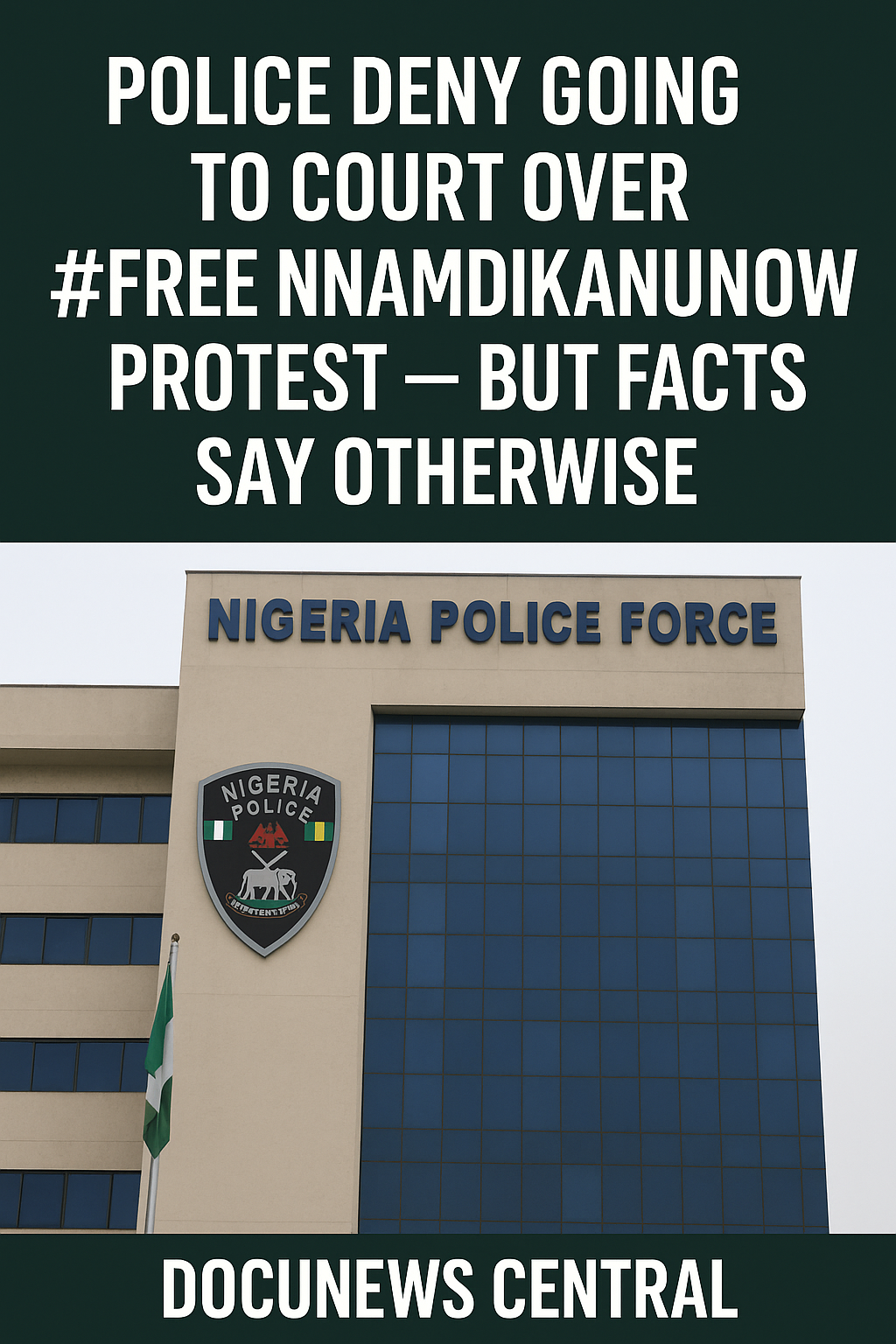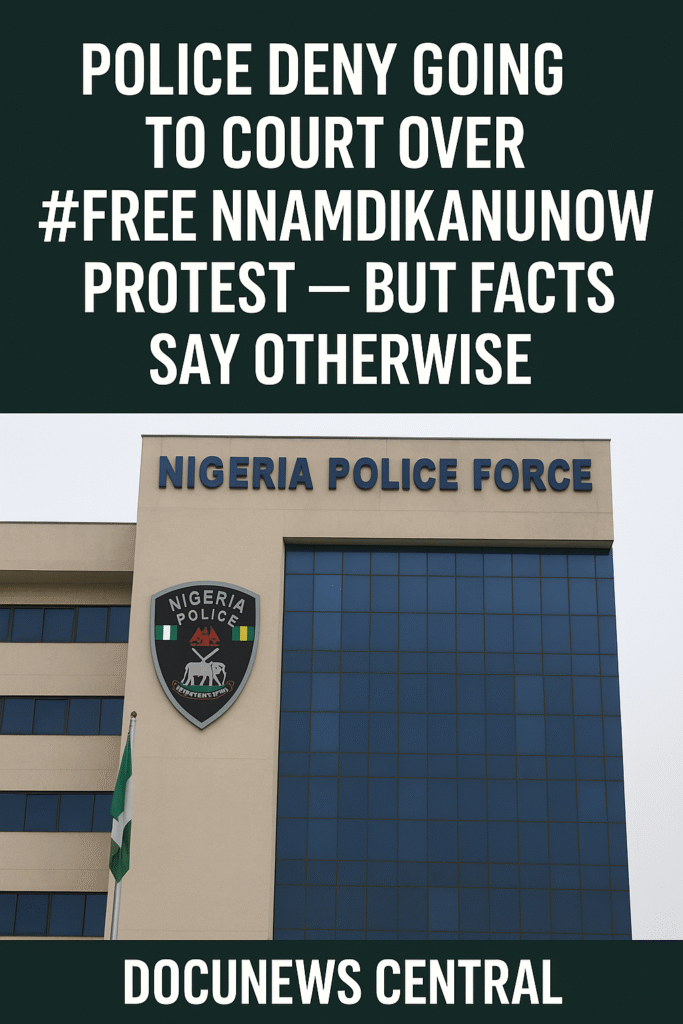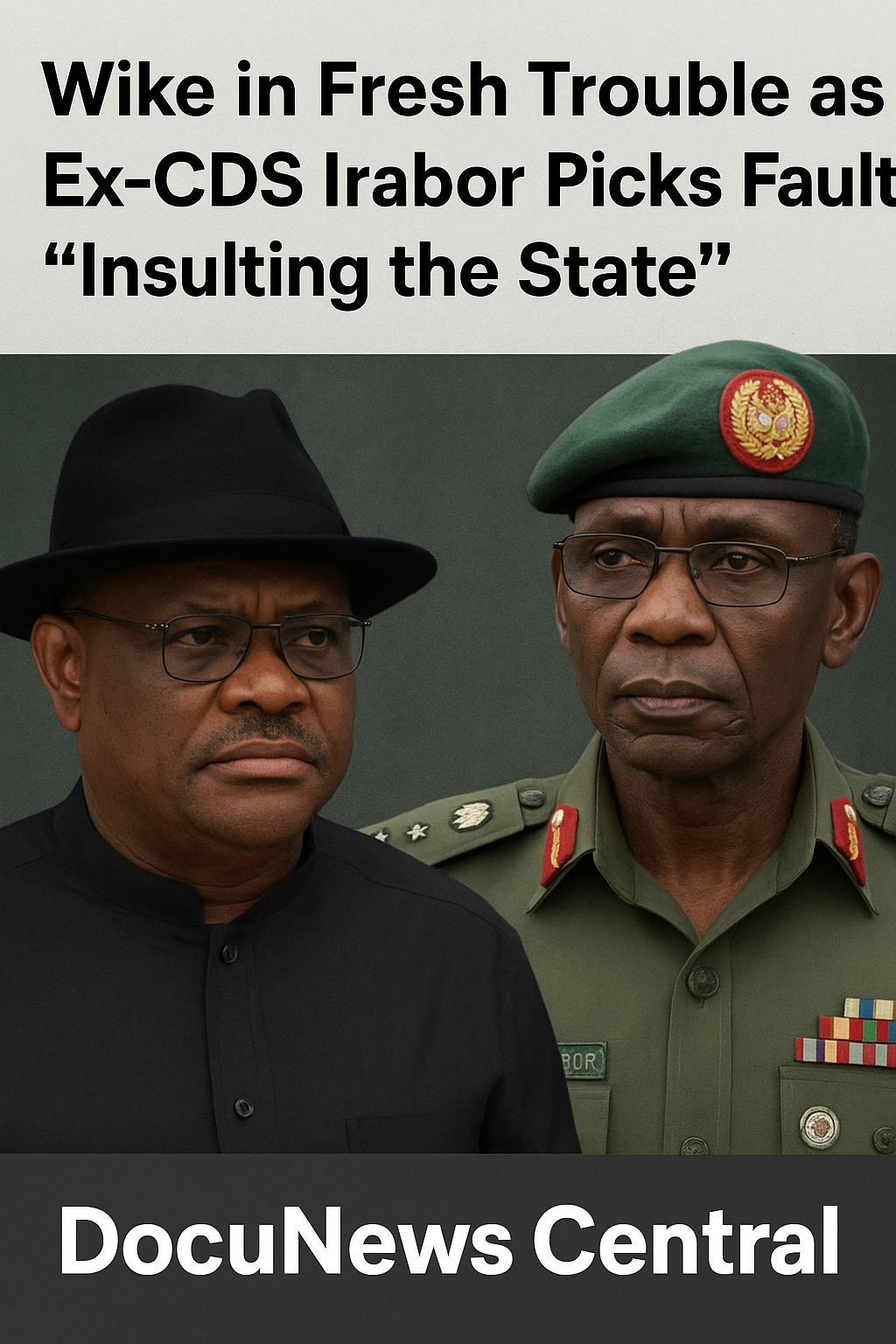

By DocuNews Central
Amid growing nationwide tension over the planned #FreeNnamdiKanuNow protest, a new wave of controversy has erupted between the Nigeria Police Force (NPF) and the Nigerian public. While the police strongly deny ever approaching the court to stop the protest, multiple credible news outlets reveal that an application was indeed filed — raising questions about transparency, intent, and truth.

A Clash of Claims: What the Police Said
On Saturday, the Nigeria Police Force, through its spokesperson, Benjamin Hundeyin, dismissed reports claiming that the Force had approached the Federal High Court in Abuja to stop the planned #FreeNnamdiKanuNow protest. Hundeyin described such reports as “false and misleading,” urging Nigerians to disregard them.
He wrote on the Force’s verified social media handle that the police “never sought any injunction to stop peaceful demonstrations.” According to him, the reports were not only inaccurate but deliberately crafted to stir unnecessary public outrage. He reminded Nigerians that peaceful protest is an inalienable constitutional right and that the Police have no intention of infringing on such liberties.
Hundeyin further called on the media to verify information before publication, stating: “At no time did the Nigeria Police Force approach the court to stop any protest. The public should ignore such misleading claims.”
His statement quickly went viral, appearing on major online platforms. Many citizens expressed relief, while others questioned whether this denial truly matched the facts.
Contradictions Emerge: What the Court Records Show
While the Police’s statement gained traction, several credible media outlets began publishing conflicting accounts. Investigations by The Guardian Nigeria, Vanguard, and BusinessDay revealed that the NPF did in fact file an ex-parte application at the Federal High Court in Abuja seeking to restrain organizers of the #FreeNnamdiKanuNow protest from staging demonstrations near key government buildings.
According to The Guardian, the police asked the court to prohibit the protest within the vicinity of the Aso Rock Villa, National Assembly Complex, Defence Headquarters, and Police Headquarters. However, Justice Inyang Ekwo declined to grant the order, instead directing that the motion be served on the respondents for a proper hearing.
BusinessDay confirmed the same account, noting that the application was titled “Suit No. FHC/ABJ/CS/1378/2025” and was filed by the Nigeria Police Force (Applicant) against the Coalition for Justice and other concerned groups (Respondents). The judge reportedly ruled that an ex-parte order would infringe on citizens’ right to peaceful assembly.
Unraveling the Discrepancy
This contradiction has sparked widespread debate. If the Police truly did not file any motion, how did the case appear on the court’s cause list? And if they did, why deny it publicly?
Analysts believe the Force might be attempting damage control. The public sentiment surrounding Nnamdi Kanu — leader of the Indigenous People of Biafra (IPOB) — remains sensitive, especially in the southeast. Any government attempt to suppress demonstrations in his name could easily escalate into national unrest.
Therefore, it’s possible that the Police’s statement was meant to reassure Nigerians that freedom of expression remains intact. However, the documented evidence of a court filing raises questions about accountability and public trust.
The Protest and Its Symbolism
The planned #FreeNnamdiKanuNow protest has drawn significant attention both locally and internationally. Organized by various civil rights groups, the protest seeks the release of Nnamdi Kanu, who has remained in custody despite several court rulings granting him bail. For many supporters, this protest represents a call for justice, equality, and respect for human rights.
Meanwhile, for the government, the protest raises security concerns. The southeast region has witnessed episodes of violence linked to separatist movements, and authorities fear a recurrence of chaos. This fear may explain why the police considered legal steps — even if they now deny them.
Freedom of Protest vs. National Security
At the heart of this issue lies a delicate balance between two fundamental principles — the right to peaceful protest and the responsibility to maintain national security.
Under Nigeria’s 1999 Constitution (as amended), citizens have the right to peaceful assembly. However, the government also holds the duty to protect life and property. The court’s refusal to grant the Police’s request appears to strike a careful balance between these principles.
Justice Ekwo’s ruling implies that while the state may regulate protests for safety reasons, it cannot outright ban them without hearing from all parties involved. This judgment strengthens the democratic framework and affirms the judiciary’s role as a guardian of civil liberties.
Media Coverage and Public Reaction
Following the denial from the police, social media platforms lit up with discussions. Many Nigerians praised Justice Ekwo for standing firm, while others criticized the police for what they called “double-speak.”
On X (formerly Twitter), hashtags like #FreeNnamdiKanuNow and #PoliceDenial trended for hours. Some users accused the government of attempting to silence dissent, while others urged protesters to remain peaceful and law-abiding.
Meanwhile, Vanguard, The Guardian, and BusinessDay continued to publish updates, further cementing public awareness. Their investigative consistency provided a clearer picture of what truly happened, helping readers separate fact from fiction.
Implications for Press Freedom and Public Trust
This incident also underscores the growing importance of credible journalism in Nigeria. In a digital age dominated by misinformation, responsible reporting becomes crucial. Outlets like Vanguard, The Guardian, and BusinessDay have demonstrated how transparency and fact-checking can strengthen democracy.
For the Nigeria Police Force, however, this controversy may linger. Even if their intention was to prevent chaos, the mixed messaging has created distrust. Restoring public confidence will require greater openness and consistent communication going forward.
DocuNews Central Analysis
From an editorial perspective, DocuNews Central believes this episode highlights a wider problem — the lack of clarity between government institutions and the citizens they serve. When official statements contradict documented evidence, it erodes faith in authority and fosters suspicion.
Transparency should not be negotiable. In any democracy, public agencies must maintain credibility through truthfulness, not damage control. Denials, if later disproven, risk deepening social divisions and undermining security agencies’ legitimacy.
As DocuNews Central continues to monitor the situation, our editorial position remains firm: accountability must never yield to convenience. Nigerians deserve the truth, not partial narratives.
Lessons from the Nnamdi Kanu Case
Nnamdi Kanu’s legal battles have shaped Nigeria’s socio-political discourse for nearly a decade. His continued detention despite court orders has fueled protests, debates, and international concern. The recent clash between the Police’s denial and media reports only amplifies this ongoing tension.
Regardless of personal opinions about Kanu’s ideology, one fact remains: justice must be transparent. Every institution — from law enforcement to the judiciary — must uphold fairness. The people must trust that the law protects everyone equally, not selectively.
Looking Ahead: Can Trust Be Restored?
Moving forward, rebuilding trust between citizens and the Police will require deliberate effort. A clear communication strategy, consistent truth-telling, and respect for legal boundaries can help mend strained relationships.
Moreover, civil society must remain vigilant. Peaceful advocacy, verified information, and responsible use of social media will ensure that public discourse stays productive rather than divisive. The goal should not be confrontation, but constructive dialogue.
If both sides — the authorities and the people — embrace openness, Nigeria can move toward a stronger democracy where truth thrives above political narratives.
Final Thoughts
While the Nigeria Police Force insists it never went to court to stop the #FreeNnamdiKanuNow protest, available evidence paints a more complex picture. The contradiction between official statements and court filings cannot be ignored. Ultimately, Nigerians deserve clarity — and only transparency can provide it.
As this story unfolds, DocuNews Central will continue to uphold its duty to report facts objectively, without bias or compromise. Because in times like these, the truth is not just a story — it’s a responsibility.
Copyright © 2025 DocuNews Central. All rights reserved.








